Air Play
Are video games the new radio? We chat to Red Octane, Harmonix, and rock stars around the world to find out.
Radio is growing old. It can no longer go to the gym, cook for itself or even put out the washing. It sits grumpily in that disheveled armchair in the corner of the family room, unwilling to get up, reminiscing about its hey-day as the glue that held a nation together through political upheavals, economic depressions, war and peace.
Musicians are the first to agree that radio is on the way out. Take Ryan O’Keeffe, for instance, drummer in Aussie pub rock band Airbourne, who made this bold statement: “I think video games are the new radio.” Five years ago it would have been laughable to suggest that radio could be superseded by video games as the leading platform for musicians to promote themselves. But the rapid rise in popularity of music rhythm games such as Guitar Hero and Rock Band has done just that. After a slow pick-up of rhythm games in the West, record companies and musicians are knocking down the doors of game publishers and developers like Red Octane and Harmonix, all vying to get their tracks heard by the millions of people around the world that are now fans.
The rewards for artists are many, from mass exposure to rising record sales. When the first Guitar Hero was being made, its publishers were able to license just one master track (i.e. original recording); the upcoming Guitar Hero World Tour is 100 per cent master tracks. The Rock Band music store has now had more than 25 million paid downloads in less than a year. To date, the Guitar Hero franchise has generated $1.6 billion (A$2.4 billion); Rock Band has global revenues of $600 million.
More artists are choosing to debut new music through Guitar Hero and Rock Band, and with so much driving the connection between music and video games, it’s time to ask: are video games the new radio?
Start Me Up
Rhythm games grew out of the video game arcades of Japan in the 1990s, where guitar, drum and keyboard simulators kept Japanese teenagers out until the break of dawn. One of the first rhythm games to be made was PaRappa the Rapper, a game about a rapping dog created for the PlayStation; it became a huge success and popularised rhythm games in Japan after its debut in 1996. Subsequent arcade and console rhythm games followed, with Benami, the music video game division of Japanese developer and publisher Konami, leading the pack with games like BeatMania, Dance Dance Revolution, Guitar Freaks and DrumMania and

The publisher of the Guitar Hero franchise, Red Octane, was first on the scene. Charles Huang, the co-founder and VP of Business Development at Red Octane, started the company with his brother Kai in 1999. The company initially began as the world’s first online video game rental service, which Huang kept up until 2007. As Red Octane began its rental operations, Huang noticed a large demand for music rhythm games, which were, at that time, hitting their peak in Asia.
“The big game at that stage was Dance Dance Revolution,” Huang said. “But what we saw was that a lot of people weren’t happy with the dance pads in the game. We knew we could design them better, so we did.”
After investing some money in importing music titles from Japan, Huang and his brother realised there was money to be made in the Western market designing better hardware products than what the imports were offering. After a few years of this, Red Octane began publishing their own games. Their first title, In the Groove, became a moderately successful dance game. Their second was Guitar Hero.
“We were fortunate enough through our years of experience in the game rentals and hardware for music games to know what consumers were looking for, and we tweaked Guitar Hero to fit more of a Western audience,” Huang said.
The first Guitar Hero was, in Huang’s words, “out of the box” for its time. He and his team were told that while the game itself was good, Western game players just didn’t buy peripheral-based music games, especially one that was so expensive and came packaged in a huge box. But Huang and his brother plotted ahead until the money all but ran out.
“We had to go out and raise more money from investors to fund the launch of Guitar Hero, and we heard the same story from them, so we weren’t able to raise the money. So my brother and I had to take out second mortgages on our houses. We basically borrowed every bit of money we could. I remember telling my wife that we should take out a loan on the house to launch this game, and she asked me, ‘But where are the kids going to live if this game doesn’t sell?’”
Luckily for Huang--and his kids--the game did sell. In fact, it became the hardest game to find in the United States during the Christmas 2005 period because Red Octane had in fact underestimated its appeal and hadn’t built enough peripherals. The buzz at the game’s launch propelled sales into overdrive and, five months after its release, Guitar Hero cracked the top ten bestselling games list, a position it held up till the launch of Guitar Hero II. Huang attributes the popularity of the games to their ability to bring people together.
“There were two things very unique about Guitar Hero when it was first released: the first was its social aspect,” Huang said. “This was before the term ‘social gaming’ had even been floated around, so this was just a game that was a lot of fun. Companies told us that people were reserving meeting rooms just so they could play Guitar Hero the entire day, and friends were saying that they were getting together on Saturday nights to play it.
“Secondly, Guitar Hero, as a game, is so accessible. You could be either seven years old or 70, and still pick up the controller to play. When we launched the first game in 2005, video games weren’t something that 70-year-olds played.”
While Huang and his team had worked with music game developers Harmonix on the first two Guitar Hero games, Harmonix was acquired by MTV Networks in 2006, and subsequently went on to develop the competing Rock Band franchise. Red Octane was itself acquired the same year by publisher Activision Blizzard, allowing the company to make use of the Activision Blizzard-owned studio, Neversoft, to continue its franchise and develop Guitar Hero III: Legends of Rock. According to Huang, the release of the third installment in the Guitar Hero franchise saw a 250 per cent increase in download sales for every song in the game.
“The turning point for us was when we realised, by analysing sales of song downloads online, that download sales of songs featured in the Guitar Hero games increased after the game’s release,” Huang said.
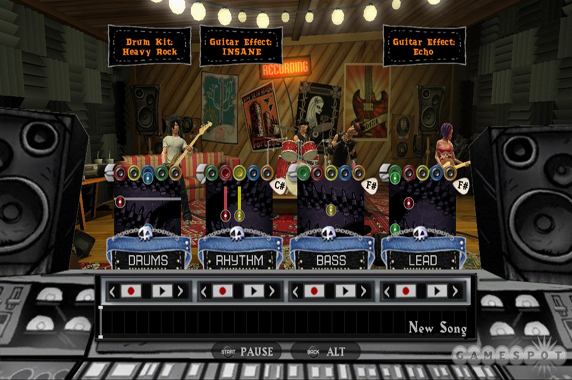
“I think that made a lot of artists realise that there are a lot of other benefits for them in working with us besides just licensing their music to the game. These days the radio plays a lot of pop and hip hop, and not classic rock. A lot of older classic artists are thus realising that perhaps Guitar Hero is the best way to reach a whole new generation of fans.
“The game franchise has a critical mass worldwide now, and that audience and reach really answer the question of what other vehicles are available, now, globally, for artists to reach that many people at once. In Guitar Hero your song is one of just 85 songs that are getting exposure and being heard by tens of millions of people.”
Artists are now petitioning Red Octane to be part of the game: Aerosmith has already actually worked with Red Octane to put the whole history of the band into Guitar Hero, whereas Metallica released their new album, Death Magnetic, as downloadable content on Guitar Hero III: Legends of Rock and the upcoming Guitar Hero World Tour.
Huang has big plans for the game’s future. On top of the 86 master tracks featured in the upcoming Guitar Hero World Tour, the game also introduces a new venture for rhythm games: a studio mode that allows users to create their own songs and share them with other players. Huang says his original vision for Guitar Hero is slowly turning into reality.
“I always thought that some day a song introduced in Guitar Hero would make the Billboard top ten,” Huang said. “I hoped that artists could release new songs through the game and those songs would have commercial success. I see this happening. We have a lot of goals on the music side that we’d like to achieve.
“One other very exciting thing we’re going to explore more of in the future is this whole concept of GH Tunes, which lets users create music, upload it, and share it with people. We’re eager to see what kind of music comes through GH Tunes, because we think that once people start using it and once we see what the possibilities are we’re going to have a lot more ideas and we’re really going to want to build that out to bigger and better future versions.”
Band on the Run
When talking of artist promotion, video games are an entirely new avenue for musicians to take. To date, no medium has been able to compete with radio in providing such mass scale exposure. Dan Teasdale, lead designer on Rock Band 2 at Harmonix, draws parallels between radio and rhythm games in their ability to promote both independent and established acts.
“We want to get that same level of exposure out to every independent band,” Teasdale said. “Imagine triple j’s Unearthed competition, but with the potential to expose all over the world. We’ve been seeing pretty big jumps in fan bases and sales for all of our artists in Rock Band, and naturally all of our artists are pretty happy about that.”
Old rockers Guns N’ Roses certainly share this view. The band chose to premiere their first new song in 14 years on the Rock Band 2 game disc. Even the surviving Beatles couldn’t resist. Harmonix recently announced that they will be working together with MTV Games and Apple Corps to develop the world’s first Beatles rhythm game, based on the quartet’s entire catalog. Currently, the Beatles do not offer their music for sale digitally via any venue, including iTunes.
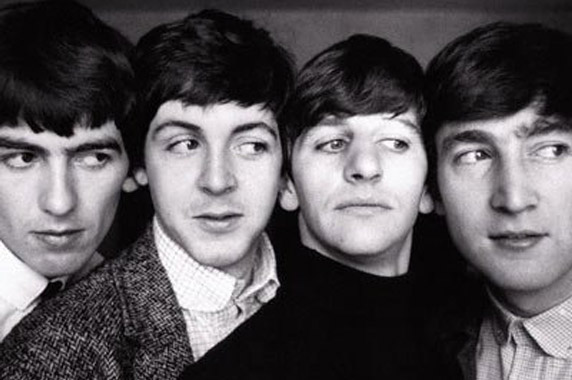
Harmonix cofounder Alex Rigopoulos, said: “It's a full, new music game built from the ground up.” Although Rigopoulos confirmed that the game would work with Rock Band instruments, no specific instruments were mentioned. The interactive music-making game will hit store shelves worldwide during the 2009 North American holiday season and will also incorporate elements of the Beatles’ career, as well as visual elements from the group’s album art and their films. Giles Martin, the musical director of the Beatles-based Cirque du Soleil show, Love, will collaborate on the project. The two surviving members of the band, Paul McCartney and Ringo Starr, were clear in their support for the new game. “The project is a fun idea which broadens the appeal of the Beatles and their music. I like people having the opportunity to get to know the music from the inside out,” McCartney said. “The Beatles continue to evolve with the passing of time and how wonderful that the Beatles’ legacy will find its natural progression into the 21st century through the computerised world we live in,” Starr added.
Developing Rock Band was a natural progression for Teasdale and the other employees of Harmonix, who are all musicians in real life. This vital link formed the basis of Harmonix as a company when it was first started by CEO Alex Rigopulos and CTO Eran Egozy in the mid-1990s. Their goal was simple: to find a way for non-musicians to experience and create music.
Rigopulos and Egozy began with musical installations and a PC music program called The Axe, but it wasn’t until they saw PaRappa the Rappa that the pair realised video games were a perfect way to bridge the gap. Since then, Harmonix has served as developer on titles such as Frequency, Amplitude, Karaoke Revolution, Guitar Hero I and Guitar Hero II and, of course, the Rock Band series.
“The idea for Rock Band was a very natural one for us,” Teasdale said. “A big chunk of us perform in real-life rock bands, and we wanted to get that experience of performing on stage and playing together out to people who don’t play musical instruments.
“Rock Band provides an authentic band experience. It’s one thing to play an instrument by yourself, but to be playing guitar with a singer, a drummer and bassist by your side is an amazing feeling. It’s all about replicating the authentic feeling of playing a real instrument live on stage. Everything we do is designed to replicate that feeling.”
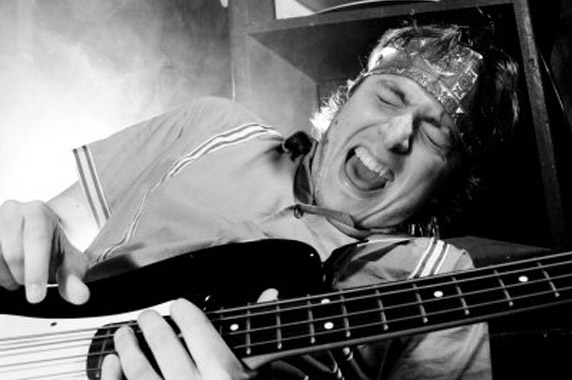
According to Teasdale, rhythm games function the same way MTV did in the 1980s, providing a new way of experiencing music and creating a social phenomenon around it.
“We weren’t expecting people to rearrange their social lives to play Rock Band. Since its release we’ve heard from thousands of people who can’t stop rocking out in their living room. What’s even cooler are the number of clubs and pubs that are running ‘Rock Band Tuesdays’ events for example, where hundreds of fans line up weekly to play on stage in full rock garb.”
Click on the Next Page link to see the rest of the feature!
Break On Through (To the Other Side)
The rising popularity of Guitar Hero and Rock Band has made the games a valuable tool for artists in the music industry. Mass exposure and the chance to reach a new generation of music lovers have established the games as a serious, and competitive, medium. It has even given some artists a chance at reinvention. Earlier this year Guitar Hero publisher Activision Blizzard announced that the upcoming Guitar Hero World Tour would feature exclusive re-records by artists Wayne Kramer, Motörhead and The Sex Pistols. According to Kramer, legendary MC5 guitarist, the benefit for artists being part of a game like Guitar Hero is as much to do with music appreciation as it is to do with millions of people hearing their work.
“With a game like Guitar Hero, ‘old’ bands no longer exist,” Kramer said. “Every band that was ever a band is a band right now. For those who are 16 or 17, The Who is a band right now. The Yardbirds are a band right now, Black Sabbath, the MC5, The Rolling Stones--it’s all right now, and I think that’s a terrific state of affairs.”
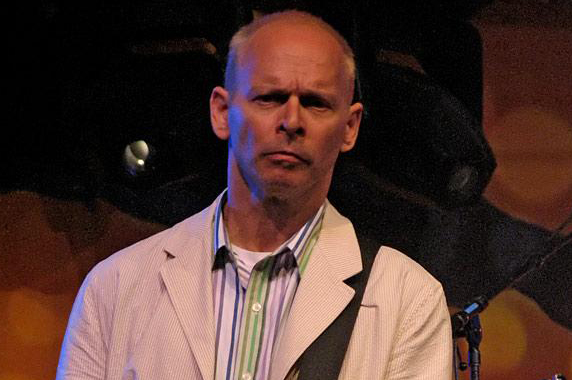
It’s a match made in heaven for Kramer, who, at 60, is still going strong, performing live shows and recording music for TV and movies. No doubt the plastic guitar would feel right at home in his hands, if he ever had time to pick it up. At this stage, he’s just enjoying the popularity among his younger fans.
“I don’t think I’ve actually ever strapped a Guitar Hero guitar on, but I’ve been talking to a few of my friends who are in the games and they all tell me they’re always getting their arses kicked by their six-year-old nephews,” Kramer said.
Kramer joined the line-up of re-records for Guitar Hero World Tour, teaming up with original MC5 producer Bruce Botnick and friends Jerry Cantrell (of Alice in Chains) and Gilby Clark (formerly of Guns N’ Roses) to re-record the MC5 hit “Kick Out the Jams”. Falling just short of the 40th anniversary of the track’s first studio recording, Kramer wanted to keep its authenticity by including the original vocals recorded by Rob Tyner in 1968.
“I wanted the sound to be really heavy and modern, but I wanted the spirit to be original,” Kramer said. “I’m really honoured that [Activision Blizzard] think the music of the MC5 deserves to be with all the other great rock artists in there. I’m really humbled by it. It looks to me like [Guitar Hero: World Tour] is a who’s who and a cross section of the wide world of rock, and it makes me grateful that other people would be that interested in my songs, and that these songs might mean something to them.”
Kramer believes Guitar Hero sends a positive message to those who play it. “Games like Guitar Hero combine art that’s been created over the last 40 years with activities that tech-savvy people of today are comfortable with and that they enjoy.
“I can’t see how it won’t inspire people to pick up a real guitar. There’s got to be some 16-year-old somewhere that gets into the game and thinks, ‘This is really great’. Inspiring kids to be musical is a great thing. There’s no downside to it. The more art that’s in people’s lives the richer their lives are.”
Four-piece pub rock band Airbourne from the rural Victorian town of Warrnambool is one of four Aussie acts to appear in either Rock Band or Guitar Hero, and the only band to appear in both. Their track "Runnin’ Wild" is featured as a downloadable song for the first Rock Band, while "Too Much, Too Young, Too Fast" will be featured in Guitar Hero World Tour.
Drummer Ryan O’Keeffe says the band has been lucky to score so much exposure. “I guess we've just been very lucky to have both games wanting different tracks from us,” he said. “It’s a great opportunity for us and we’re very pleased.”
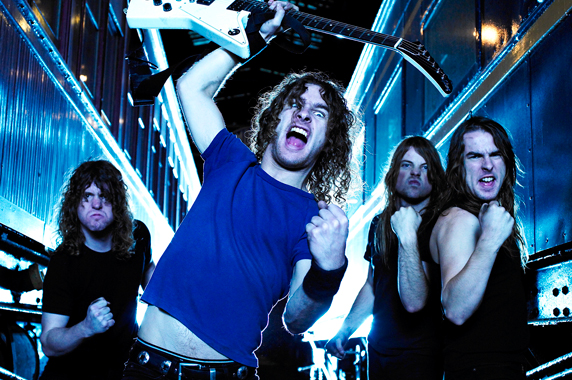
The band got their start in Melbourne, where they gigged relentlessly. With only an EP to their name, Airbourne’s live shows created such a buzz that they were soon asked to support the Rolling Stones and Mötley Crüe before embarking on a national tour with Dallas Crane, Jimmy Barnes, The Living End, You Am I, and Magic Dirt.
After moving to the United States in 2006 to work on their album Running Wild, Airbourne signed a deal with Roadrunner Records in New York. The band members are no strangers to video games--their tracks are featured in Madden NFL 09, Tony Hawk's Proving Ground, Need for Speed ProStreet, and NASCAR 09. But O’Keeffe admits it wasn’t until Rock Band and Guitar Hero that the band saw just how effective video game exposure could be.
“We see a lot of people discovering the band for the first time, which is great,” O’Keeffe said. “I think games like this are a great addition to the ever-growing music scene: they allow people to interact with music on an entirely different level. Our involvement with both Rock Band and Guitar Hero has helped get us out there and known to people right across the globe.”
Money (That’s What I Want)
Bringing music to the people is an admirable mission statement, but there’s more to Guitar Hero and Rock Band than just idealistic sentiments. Both franchises have made billions worldwide--Guitar Hero has sold 23 million units globally in less than three years and has generated $1.6 billion. By comparison, Rock Band has sold four million units and has global revenues of $600 million. With such attractive revenue to partake in, is it really any wonder that bands are falling over themselves to be involved?
American punk rockers NOFX, for one, have no qualms about admitting their motives for involvement are purely fiscal. “We got involved because we wanted the money,” NOFX front man Mike Burkett (aka Fat Mike) said via phone from Buffalo, US. “I know you’re expecting a somewhat better answer but I’m going to be honest.”
For years, NOFX has stayed away from the public eye, consenting to very few interviews--citing media exploitation as the reason--and kept to themselves while working on their music. It therefore came as something of a surprise when, earlier this year, it was announced that NOFX would be part of the upcoming Guitar Hero World Tour.
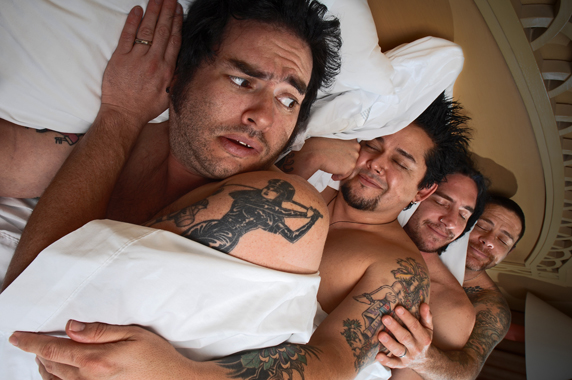
But, as can be expected from a brutally honest band that satirise everything from politics to religion and whose songs feature frequently in porn films, NOFX weren’t hiding their reasons for getting involved; in fact, they weren’t hiding much at all.
“I’m in a band, so video games aren’t really my thing. I’m more into golfing, and f******,” Fat Mike said.
The band may not have time to play video games, but they’re no stranger to the medium itself, with songs in the Tony Hawk series and NHL 07. But despite this being their first foray into rhythm games, Fat Mike remains skeptical about Guitar Hero’s ability to make the band any cooler.
“We’re a band trained to work by ourselves, and I think we’ll continue to stick to CDs. I do think games like Guitar Hero might be very useful to newer bands, but we’re pretty happy where we are right now,” he said.
He’s not really enthused about the game’s influence on young people, either.
“My four-year-old daughter is too young to play Guitar Hero, but even when she grows up I think I’d prefer her to learn real guitar. I don’t think rhythm games inspire anyone to pick up a real instrument, purely because it makes playing look a lot simpler than it actually is. When people actually pick up a real instrument they’ll just think that it’s a lot harder than the game they’re been playing and go back to the plastic guitar,” he said.
“I hope it does inspire kids to play real instruments. I’m just an experienced pessimist.”
Fat Mike is not alone. After being hired to promote Guitar Hero III at Activision Blizzard’s launch party for the game, Sex Pistols singer Johnny Rotten denounced the game for teaching players “how not to be rock stars.”
But the feedback Red Octane receives every day from Guitar Hero fans all over the world is proof enough of this.
Having maintained their strong customer base since their game rental days, Red Octane is flooded with daily emails from Guitar Hero enthusiasts. Charles Huang remembers an email from one very happy father who had used the game to bond with his 14-year-old daughter for the first time in many years.
“He had spent a few hours playing Guitar Hero with her and she had asked him about the music,” Huang said. “He wrote to us to thank us for giving him those couple of hours with his daughter. That, for us, was very powerful, and we realised that this game is very different from a lot of other video games.”
Feedback from players also led Red Octane to discover that the game encouraged users to take up playing real guitar.
“I think users are learning about the basics of music,” Huang said. “The game teaches them the basis of instrumentation, which is critical. There’s a certain satisfaction at becoming more proficient in the game, and at certain levels there will be people who will want to take that extra step and take on a real instrument.
“Some of the feedback we got when we were going to market with the first Guitar Hero was that classic rock and metal are dead musical genres, and that 20-year-old players would never buy a game with what was referred to as ‘dad rock’. As the game began selling, the comments changed. Kids emailed to say they never realised how cool rock and roll was. Suddenly we realised that what we were doing with Guitar Hero was taking music from a different era and introducing it to a whole new generation who may not, on their own, choose to listen to it.”
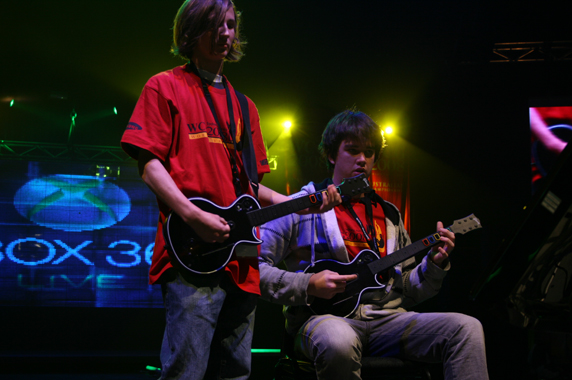
Dan Teasdale from Harmonix also believes it’s no myth that games like Rock Band encourage people to learn real instruments. He recalls one of the more memorable stories that reached his ears.
“A nine-year-old girl who was taking drumming lessons showed up to her lesson one week and executed a perfect roll across the kit--without the teacher ever telling her what to do. When he asked, she said she’d learnt it from playing Rock Band. From that point on, the teacher incorporated Rock Band into his learning program, right down to colouring the drum surfaces and cymbals.
“It’s incredibly rewarding knowing that we’re helping people not only become musicians, but become better musicians. Even I wouldn’t be able to play the drums if it wasn’t for Rock Band.”
Got a news tip or want to contact us directly? Email news@gamespot.com
Join the conversation